|
A FAST Vision for the Triangle
Since its inception, the Regional Transportation Alliance has focused on delivering business leadership to get our region moving faster. Recently, RTA held its 2020 Transportation Breakfast. This year’s event went virtual due to the pandemic. Even though the business community was not able to gather in person, it didn’t slow the goal of getting our region moving faster. “RTA is funding two ongoing studies with the goal of enhancing transit,” said Joe Milazzo II, RTA executive director. The regional business community wants to thank all of the panelists for speaking, as well as the Research Triangle Foundation of North Carolina for their partnership as the presenting sponsor of the RTA Transportation Breakfast. We also want to thank all of RTA’s members for their continued support and engagement. You can download the full event presentation via letsgetmoving.org/breakfast. FAST study “The first study, funded by the regional business community, in concert with great partners NCDOT and GoTriangle, is to create a Freeway And Street-based Transit network, or FAST network,” Milazzo noted. This project would link our region, complement upcoming bus rapid transit investments, and connect with RDU Airport, as well as future commuter rail. At the Transportation Breakfast, we heard from representatives of VHB, the lead consultant for the FAST Study. “The purpose of this study is to accelerate the movement of transit in this region,” said Taruna Tayal, VHB project manager. “This study will capitalize on the great work that’s already been done.” The FAST Study would include low-cost improvements on freeways, including transit bypasses of future on-ramp signals and expansion of the region’s bus on shoulder system (BOSS). “On the street level, the main tools that we have include traffic-signal priority that extends the green time to allow buses to avoid stopping at a signal,” said Don Bryson, VHB principal-in-charge. “There also are queue jump lanes that allow a bus to get around a stack of vehicles waiting at a red light, or RED transit lanes that provide priority to buses.” The concept includes illustrative corridors serving Raleigh, Cary, Garner, RDU Airport, RTP, Durham, Chapel Hill, and other communities. There is a public comment period on the FAST Study until Aug. 31. Please submit your comments to [email protected]. Zero Fare pilot The second study is to advance the next zero fare pilot for transit in our region. RTA commissioned HDR to perform that study and several HDR representatives also spoke at the Transportation Breakfast. “Zero fare reduces travel costs for users,” said Jorge Luna, HDR senior transit planner and project manager. “It also enhances equity, increases ridership, and improves accessibility and economic competitiveness.” “Ridership goes up 20-30%,” said Patrick McDonough, HDR senior transit planner. “There are higher travel speeds because people aren’t fumbling through money when they get on the bus to pay for their ride.” He said that some areas across the country are covering the lost fare revenue with sales tax revenue. Both acknowledged there are challenges, including the pandemic, which limits ridership on most buses to 10-16 people. Options to expand the study include zero fare weekends for GoRaleigh, GoDurham, and GoTriangle, as well as either zero fare weekends or seven-day zero fares for GoCary. Milazzo said RTA believes a pilot along the lines of consultant recommendations has promise, but said transit partners are not ready yet for it given constraints related to the pandemic and funding concerns. RTA will launch a follow-up study. “We’ll continue to elevate the conversation regionally,” said Milazzo. There also is a comment period for this study through the end of August. Anyone with comments on the zero fare pilot initiative should email [email protected].
0 Comments
We’ve all likely done these drives at some point. Raleigh to D.C. Raleigh to Charlotte. For each, we know we’ll spend hours in the car.
Now imagine being able to get to D.C. in less than 30 minutes. Charlotte too. That’s if a mid-Atlantic or southeast regional hyperloop would become a reality. “When hours become minutes, it changes everything,” said Ryan Kelly, head of marketing and communications with Virgin Hyperloop One. “It impacts where you can live, where you can work.” Hyperloop would transport people in a cargo pod through an electromagnetic propulsion system at speeds over 600 MPH for longer corridors. Within the Triangle, the pods could achieve speeds over 300 MPH between Raleigh and Durham. Kelly spoke to the regional business community about the potential for hyperloop at the annual RTA Transportation Breakfast. “The pod itself propels and then levitates off of a track,” he said. “We control the weather inside the tube so there is no turbulence.” Kelly said the technology should not feel like science fiction. “We are way behind on this,” he said. “No one in this room is going to say that investing in the train or the plane was a terrible idea.” Kelly said it also would be a technology for everyone. “We want this to be a mass transportation solution, so we want it to be priced appropriately,” he said. Joe Milazzo II, executive director of the Regional Transportation Alliance, discussed Hyperloop in his Thursday Thoughts at 3 blog: “Hyperloop … would be transformational,” he wrote. “The ability to consistently get from Raleigh to another southeastern or mid-Atlantic region in under 30 minutes will completely change the way we think about metropolitan areas and, to some extent, the economic benefits of agglomeration.” We want to thank Kelly and all of our speakers for sharing their insights on an exciting, new technology and its prospects for our region. The conversation generated a tremendous amount of interest and news coverage, including The News & Observer, Triangle Business Journal, WRAL, and WRAL TechWire. Nationally, TechCrunch, Cheddar, Gizmodo, Engadget, and TechSpot covered the conversation. Our official event hashtag on Twitter, #RTABFAST19, was the top trending topic that morning in Raleigh and Greensboro and was the second most trending topic in Charlotte. Please also mark your calendars for Jan. 17 and The State of Mobility 2020 – RTA 18th Annual Meeting. Hundreds of state and regional leaders will gather to hear the business community’s perspectives on transportation trends and progress in the Triangle. That event will be from 11:30 a.m. – 1:30 p.m. at the Embassy Suites Raleigh-Durham/Research Triangle. We look forward to seeing you there! Every day, you start from home and head to work. Hopefully, your trip goes smoothly and you don’t run into any traffic!
What you may not be thinking about during your travels is how the regional business community is looking every day for ways to make your journey quicker and easier. That’s where the Regional Transportation Alliance, a program of the Raleigh Chamber, comes in. They know that, when figuring out the future of Triangle transportation, there truly is no finish line. More initiatives, more innovation, and more inspiration always will be necessary! No finish line also is the mantra used by the NC Courage, who completed a dominant season by winning the NWSL championship and the Women’s International Challenge Cup. To show what that means to this community, RTA awarded the Courage with the 2019 Regional Inspiration Award. Jessica McDonald, the NWSL championship MVP, accepted the award on behalf of the team at the RTA 17th Annual Meeting – The State of Mobility 2019. She also appeared in this video, along with RTA staff and members of the RTA Steering Committee. Now that you’re fired up after watching the video, let’s tackle transportation! We, along with RTA, were pleased to welcome Mike Fox, chair of the North Carolina Board of Transportation, as the keynote speaker for RTA’s Annual Meeting. “2018 was a busy year for us,” said Fox. “It was a year of major accomplishments.” He referenced the anticipated opening in a couple months of the Bonner Bridge in Dare County on the Outer Banks. Fox also talked about the passage of the Build NC legislation, which accelerates some local and regional road projects across the state. He then discussed some of the federal grants North Carolina received in 2018, and the state’s response to Hurricane Florence which resulted in 2,468 cumulative road closures. Fox also shared plans for the future. “We will keep the momentum going,” he said. With more cars on the road that are electric or hybrid (and the discussion of autonomous, self-driving cars), Fox said there needs to be more attention on the impact to revenue from the motor fuels tax. “We need to discuss how we go about funding transportation moving forward,” he said. “With cars changing, our revenue from the motor fuels tax will go down.” Fox concluded by saying that efforts will continue to improve how the state delivers projects that communities want, need, and will use. Following his address, RTA Executive Director Joe Milazzo II spoke about The State of Mobility. He summarized RTA’s top five priorities.
Milazzo said 2018 was a great year for RTA and the region. RTA grew as an organization to more than 110 members, including 74 at the Leadership and Bronze levels. That marks a 50 percent increase since 2014. Also, Milazzo mentioned how RDU Airport is experiencing significant growth. “RDU is on an absolute tear,” he said, referencing the now 11 air carriers at RDU and how Frontier Airlines has gone from three to 32 summer destinations in 18 months. “The airport had the highest number of passengers last year by far,” said Milazzo. He also talked about challenges that are ahead for 2019 and beyond. “The new draft state transportation plan is brutal from a scheduling standpoint,” said Milazzo. He said it would end up delaying many major projects in our region and statewide, including the US 1 conversion to freeway north of I-540, the US 70 conversion to freeway west of TW Alexander, improvements to US 64 west, and the widening of the Wade Avenue freeway. Milazzo encouraged the business community to focus on areas where it could make an impact including finding funding solutions, joining the “Let’s Make I-40 Better” Action Team, and participating in traffic studies such as the analysis of Capital Boulevard between the beltline and I-540. The event then concluded with an executive panel including Milazzo, Bobby Lewis, chief operating officer for NCDOT, Bruce Sargent, RTA 2018 chair and the director of IBM North America Real Estate and Strategy Operations, and Geoff Lang, RTA 2019 chair and the vice president and general manager of MetLife’s Global Technology Campus in Cary. We want to join with our partner, RTA, in thanking the presenting sponsor of The State of Mobility 2019, the Research Triangle Foundation of North Carolina. Thank you, also, to all of the speakers for their great insight, and to all of the RTA major investors and sponsors who made this event possible. Finally, we also want to thank Brios Media for producing the great video! The State of Mobility generated a lot of interest and discussion in our area. Our official Twitter hashtag, #RTASOM19, was among the top trending topics that day in the Raleigh area. Don’t forget to be on the lookout every Thursday at 3 p.m. for RTA’s Thursday Thoughts at 3, a weekly series that offers perspectives on regional transportation issues. You can find it on RTA’s blog site. If you are not yet an RTA member, we encourage you to join them. Check back later on our events page to find out more about the next RTA event, the RTA Transportation Breakfast, which will be held on July 12. 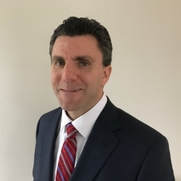 By Joe Milazzo II, PE Executive Director Regional Transportation Alliance The Research Triangle region is actively engaged in the national competition to win Amazon's new "HQ2," as this new microsite demonstrates. While no region in North America has a "lock" on winning an economic development opportunity of $5 billion and 50,000 jobs, in reality, Raleigh, Durham, and the entire Research Triangle region have been winning the competition for top jobs for decades. This week's business news clips provide a great demonstration of our market’s success, and a clue or two as to why. A Bloomberg article this week noted that Raleigh and Durham were both in the top 7 nationally in the Bloomberg "Brain Concentration Index." This index compares metro areas with at least 100,000 people, and assesses them on several factors, including: concentration of full-time STEM (science, technology, engineering, mathematics) workforce, advanced degrees or science and engineering undergraduate degrees, and net business formation. Meanwhile, the U.S. Census Bureau, focusing solely on the attainment of bachelor's degrees, noted that both Raleigh-Cary and Durham-Chapel Hill were in the top 5 nationally in college attainment. Why does our market consistently succeed? The reality is that our strengths continuously reinforce themselves: our educational prowess attracts both people with high degree attainment and jobs that require advanced education. In addition, you get the best of all worlds here: East Coast location without eastern seaboard hassles, metropolitan amenities and 18-hour city convenience without large urban headaches. From a mobility standpoint, our market has clearly, and uniquely, hit what I might call the “sweet spot of dispersal and agglomeration.” We are spread out enough to keep severe traffic at bay, but still close enough— and increasingly connected enough—for us to take advantage of our collective strengths. Those strengths begin with our three tier one research universities, and they grow - and we go - from there. Do I think we will win Amazon? I think we have a great opportunity. Our region does not need to land HQ2 to be successful—we already are successful, and will continue to be—but an HQ2 investment from Amazon here would make our market even better, faster. We wish Amazon well, wherever they choose to invest. Learn moreJoe Milazzo II, PE, is executive director of the Regional Transportation Alliance, the voice of the regional business community on transportation. Learn more about how RTA leverages the strength of more than 100 leading member companies and 23 member chambers of commerce working in concert with regional partners to advance transportation solutions that grow our economy.
Joe Milazzo, executive director of the Regional Transportation Alliance, was recently honored by the Chapel Hill-Carrboro Chamber of Commerce with the Chair's Award for Public Private Partnership. Full citation of the award presentation is below. Now 14 years as the executive director of their organization, this individual convenes elected officials, senior government staff, technical experts, and the business leaders to solve problems. He is delightfully impatient and jokes that the mission of his organization is not “Let’s get ready to” nor “Let’s think about doing something,” nor “Why don’t we study this, but not do it.” Instead, the impactful motto of his organization is “Let’s Get Moving.” Please join me in recognizing the CEO of one of this region’s most relevant and effective business leadership organization, The Regional Transportation Alliance’s Joe Milazzo, the recipient of the 2017 Chair’s Award for Public Private Partnership. When you are on the road—whether in your car, on the bus, on the sidewalk, or even the shoulder—you should think of and thank Joe Milazzo. RTA is a chamber of commerce-based regional business leadership and advocacy group focused on advancing transportation policy, priority, and funding solutions in our entire region. Under Joe’s leadership, RTA has successfully advocated for the construction, enhancement, and advancement of more than 250 miles of freeway and improvements at seven existing or proposed interchanges. He also spearheaded the Multimodal 54 initiative, which ensures that Chapel Hill and Carrboro are not cut off from the rest of the Triangle region. Joe launched the Air Service Advancement Project (ASAP) private sector marketing initiative as well, culminating in a Paris flight in 2016, making RDU the only non-hub U.S. airport with two nonstop transatlantic flights. Additionally, Joe coordinated the creation of our state’s first “Bus on Shoulder System” or “BOSS” to reduce transit travel times between Durham, Chapel Hill, and Raleigh, now including 60 shoulder miles as one of the largest BOSS systems in the United States. Congratulations, Joe—what a BOSS you are! We’re grateful for your leadership in the region and in our Chamber. (Thanks to the Chapel Hill-Carrboro Chamber for the citation. See a full list of winners and more here.) Learn more about RTAA program of the Greater Raleigh Chamber, the Regional Transportation Alliance is a membership group of nearly 100 companies across the Triangle and 23 member chambers of commerce in central North Carolina. It is the regional business voice for transportation initiatives and policies including strategic funding, transit, freeways, streets, air service, and rail.
Learn more at www.letsgetmoving.org. Follow RTA on Twitter at @RTATriangle.  By Joe Milazzo II Executive Director Regional Transportation Alliance Last year our region launched a second transatlantic flight and passed dedicated funding for a bold and flexible transit plan in our region's largest county. In 2017, the Regional Transportation Alliance will focus on accelerating 540, funding the RDU Master Plan, and creating a FAST Mobility Fund, along with advancing the other priorities listed below. Top Priority: Accelerate 540 The regional business community's top priority will be to accelerate the construction of 540 in southern Wake County to I-40. The draft state TIP was released last week, and it contained both good and challenging news for 540, with some segments accelerated to 2020 and other portions delayed to 2020. For more information about 540, read NCDOT's response to a letter we wrote last spring in cooperation with the Southern Environmental Law Center regarding anticipated costs, revenues, and time savings associated with the proposed freeway. Fund RDU Master Plan RDU has created a solid Master Plan for the next 25 years to guide the growth of our hometown international airport—now we need to fund that plan to complete essential improvements including reconstructing our primary runway. As RDU CEO Mike Landguth says, "Air service development is economic development," and nearly 50 nonstop flights, including two daily transatlantic flights, provide essential connections for commerce and tourism. If we want to continue that momentum for our growing region, RDU needs to grow right along with us, and that will require a sustainable funding mechanism. Create a FAST Mobility Fund to Accelerate Simpler Improvements As I mentioned during our annual meeting last month, we are seeking a faster way to fund lower cost projects. A "FAST" mobility fund would focus on accelerating smaller projects to provide congestion relief in a timely manner. The Strategic Transportation Investments law has removed politics from transportation prioritization, and that has advanced a number of major projects for our region and state. A FAST mobility fund (or similar) would complement the success of STI for smaller projects, such as advancing potential rapid intersection improvements to the Multimodal 54 corridor between I-40 and Chapel Hill and various roads and streets regionwide. Other Focuses of the Regional Business Community We heard three terrific presentations on the future of mobility at our annual meeting last month—if you want to relive them, you can download them here. In 2017 we will continue to support solutions that will move our region forward and improve our multimodal future:
2017: Another Vital Year for Mobility We have had a great story to tell since 2002, and with the help of our current members and new investors we will continue to move the region forward. See the full RTA 2017 Action Plan here. 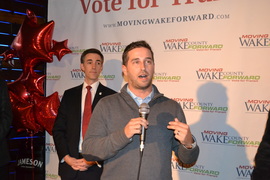 A message from Chamber President and CEO, Tim Giuliani With the leadership and support of many Chamber members, local business, and elected partners, the Wake County half-cent sales tax referendum to fund a modern public transportation system has passed. Thanks to everyone who took part in this important community initiative. From posting yard signs to offering a donation, each contribution was significant to moving us forward. It has been a pleasure seeing the community come together to develop the Wake Transit plan and support the referendum. The combination of a solid, bipartisan plan and broad, community support yielded its success. We look forward to everyone’s continued engagement as we plan for our community’s future growth. Onward, Tim Giuliani President and CEO See Press Release Below: The Greater Raleigh Chamber of Commerce applauds the successful passage of the Wake County half-cent sales tax referendum to fund a modern public transportation system. “Our region is growing quickly—Wake County’s population adds 64 people every day. This referendum gives our community the resources to be prepared for the future and to build a modern public transportation system that provides transportation options for everyone,” said Chamber President and CEO Tim Giuliani. Successful passage of the referendum secures the dedicated, locally-controlled funding source to implement the approved, bipartisan Wake Transit plan. All three Triangle counties—Wake, Durham, and Orange—now have voter-approved referenda for enhanced regional transit. Giuliani added, “With more than a million people already living in Wake County, we can plan for the continued growth that brings traffic and congestion and maintain our excellent quality of life.” The Moving Wake County Forward referendum campaign was led by a diverse, broad-based committee co-chaired by Mayor Mark Stohlman of Morrisville, Mayor James Roberson of Knightdale, Dr. Tashni-Ann Dubroy of Shaw University, and John Kane of Kane Realty. More information about the Wake County Transit can be found at www.waketransit.com. What can our region learn about transit from northern Virginia? Around 50 regional business, elected, and transportation leaders will find out this week as part of the Regional Transportation Alliance's leadership briefing and field visit. Attendees will:
Seeing commuter rail, bus rapid transit, and bike share in a fast-growing, competitive market like northern Virginia will help local leaders better understand key elements of our regional transit future. This experience is particularly timely as our region prepares for an important transit referendum vote this fall in Wake County. Follow AlongThe Leadership Briefing and Field Visit begins Tuesday, June 28. See a detailed agenda here, and find out what attendees are experiencing in real-time with the hashtag #RTAtour16 on Twitter and Instagram. Follow @RTATriangle for the latest transit information!
 by Bruce Sargent Site Operations Manager IBM Corporation, Research Triangle Park RTA Air Service Chair The Regional Transportation Alliance is partnering with the RDU Airport Authority to launch a multifaceted advertising campaign for the new RDU – Paris flight. The new RDU – Paris nonstop flight was announced fall 2015 thanks to organized business community support, key corporate funding, and the efforts of local partners and RDU Airport Authority. The marketing campaign will be funded in part by the RTA Air Service Advancement Project, which launched in December 2014 to create a regional marketing fund for new nonstop transatlantic air service. Both cash and in-kind investments made as part of the ASAP initiative will complement marketing expenditures by RDU Airport Authority to help ensure the success of the Paris flight by increasing awareness of the offering and encouraging its use. Be on the lookout for RDU – Paris advertising via web, radio, TV, outdoor, event, and other channels, and help share information about the new flight with friends and colleagues. RTA thanks all ASAP investors for helping to promote awareness of this new international connection from our market! Thank you to all of the ASAP investors: Cary Chamber of Commerce Cisco Systems, Inc. Citrix Credit Suisse Duke Energy Duke University Fairway Outdoor Advertising First Citizens Bank Forge Communications Greater Raleigh Chamber of Commerce Greater Raleigh Convention and Visitors Bureau IBM Corporation Morrisville Chamber of Commerce Quintiles Red Hat, Inc. Research Triangle Foundation of North Carolina UNC REX Healthcare Wells Fargo And thank you to the ASAP in-kind partners: Cary Chamber of Commerce Chapel Hill-Carrboro Chamber of Commerce Chapel Hill / Orange County Visitors Bureau Durham Convention and Visitors Bureau Morrisville Chamber of Commerce Greater Raleigh Chamber of Commerce Greater Raleigh Convention and Visitors Bureau Downtown Raleigh Alliance Regional Transportation Alliance The Umstead Hotel and Spa Companies can still join the Air Service Advancement Project and do not have to be an RTA member. Go here for more information about how you can help sustain and enhance our region’s connection to the world ASAP. This blog originally appeared on the Regional Transportation Alliance's website here. RTA Air service chair Bruce Sargent serves as Site Operations Manager at RTA Leadership Team member IBM from their Research Triangle Park campus. 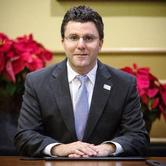 This blog was originally published by the Regional Transportation Alliance on Dec. 12. Read the original here. By Joe Milazzo II, PE Executive Director Regional Transportation Alliance The Regional Transportation Alliance business coalition has been at the forefront of a decade-long push to authorize a new Interstate freeway corridor from Raleigh to coastal Virginia. Two years ago this month, we achieved our first taste of victory when Gov. McCrory announced the approval of the future I-495 corridor from Raleigh to Rocky Mount at our 2013 annual meeting. I-495 signs were posted between Raleigh/I-440 and Knightdale/I-540 in spring 2014, along with future I-495 signs between Knightdale and Rocky Mount/I-95. Earlier this month, President Obama signed the federal “FAST” transportation funding act. That bill clarified the high priority corridor routing for the Raleigh-Norfolk corridor via Rocky Mount, Williamston, and Elizabeth City, and then formally authorized the future Interstate designation for the entire corridor from Raleigh to coastal Virginia. The future Interstate designation from Raleigh to the Hampton Roads region of Virginia will be I-44, I-50, I-89, I-56, or another suitable two-digit number. Whatever the number, the designation will begin in east Raleigh at or along I-440, and end in coastal Virginia at Chesapeake (at I-64), Norfolk (at I-264), or Virginia Beach (at the end of I-264 at Birdneck Road). This new authorization by Congress of a future Interstate for the US 64 and 17 corridors between Raleigh, Rocky Mount, Williamston, Elizabeth City, and coastal Virginia sends a clear signal to developers and economic prospects that this corridor’s future is an Interstate freeway. For Raleigh and the capital area, this authorization will allow our market to get our second two-digit (i.e., primary) Interstate, and that will help with both economic development and tourism. Given the fact that every county along the corridor east of I-95 has been designated a tier one (most distressed) county by NC Commerce, this authorization could not be more timely in terms of helping to attract future job creators to northeastern North Carolina in addition to our growing Triangle area. Indeed, for many of these counties, this future Interstate corridor is the only plausible way that they could have Interstate access in the foreseeable future. It will quite literally put them on the map from an economic development standpoint, from eastern Nash County to Camden County at the Virginia border. Of course, the future Interstate effort alone will not solve all of the economic challenges facing northeastern North Carolina, but it can certainly help, by providing an economic lifeline to counties that need it and link urban, suburban, and rural job centers together. We have previously called this initiative a bipartisan gift to our children’s future prosperity. With the entire NC Congressional delegation in support of the source bills, along with several members of the VA delegation, it is clearly bipartisan. While it will take many years to fully upgrade the corridor, the future Interstate authorization should make it easier for communities and NCDOT to focus their transportation investments and priorities along the corridor. As I noted last year, kudos to the bipartisan support at the federal, state, and local level for this initiative. A new Interstate designation will be the next step in a century of investment along the corridor, serving a region whose greatest days are still to come. Before I forget — the federal FAST bill also includes a future Interstate authorization for the US 70 corridor from Garner to Morehead City. That corridor, which will be called I-46 or another suitable designation, will travel from I-40 at the Wake/Johnston county line to Morehead City near the state port. Check out the Regional Transportation Alliance's blog for updates and more. |
AuthorGreater Raleigh Chamber of Commerce Archives
July 2024
Categories
All
|
|
Greater Raleigh Chamber of Commerce
800 S. Salisbury St. Raleigh, NC 27601 |

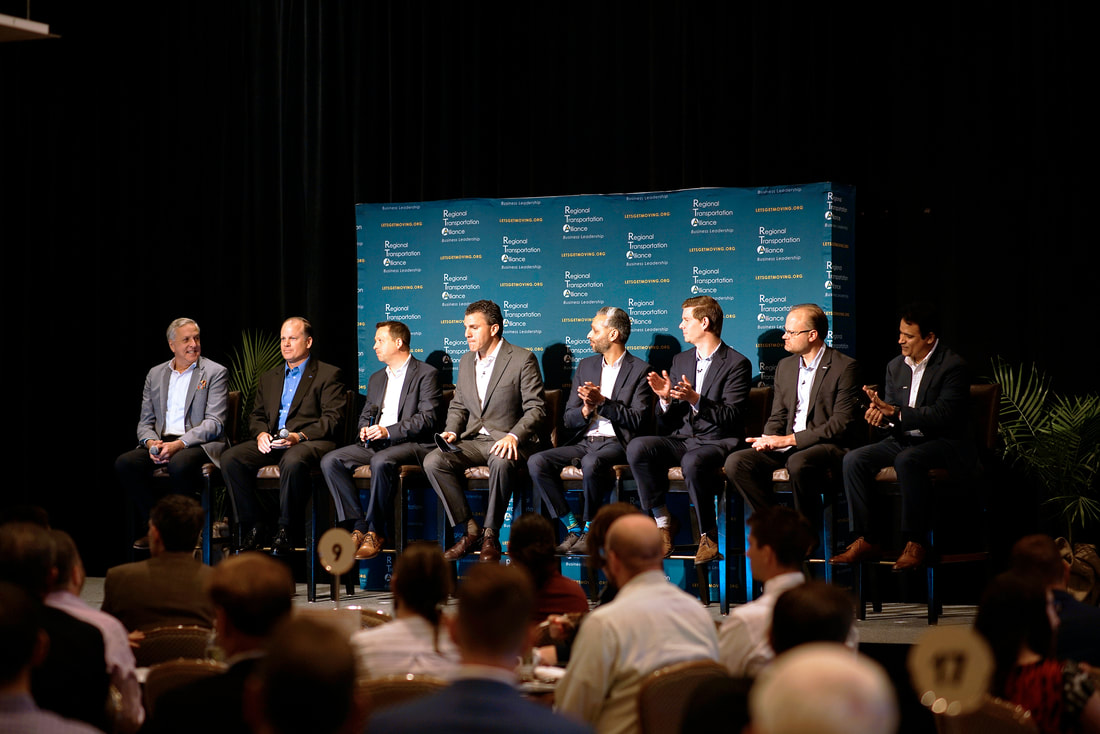
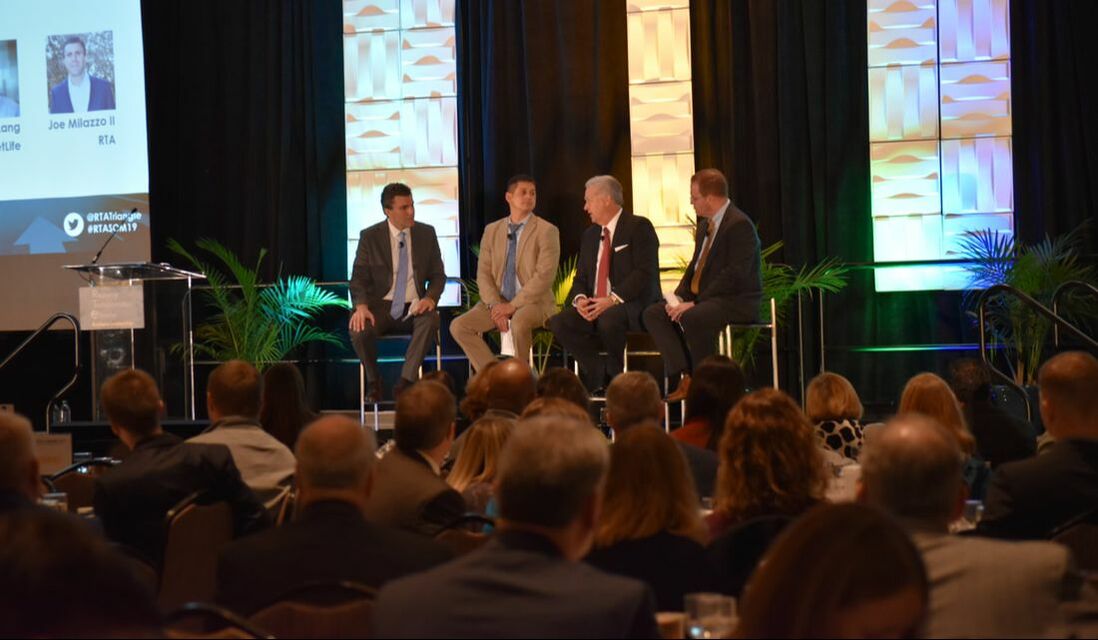
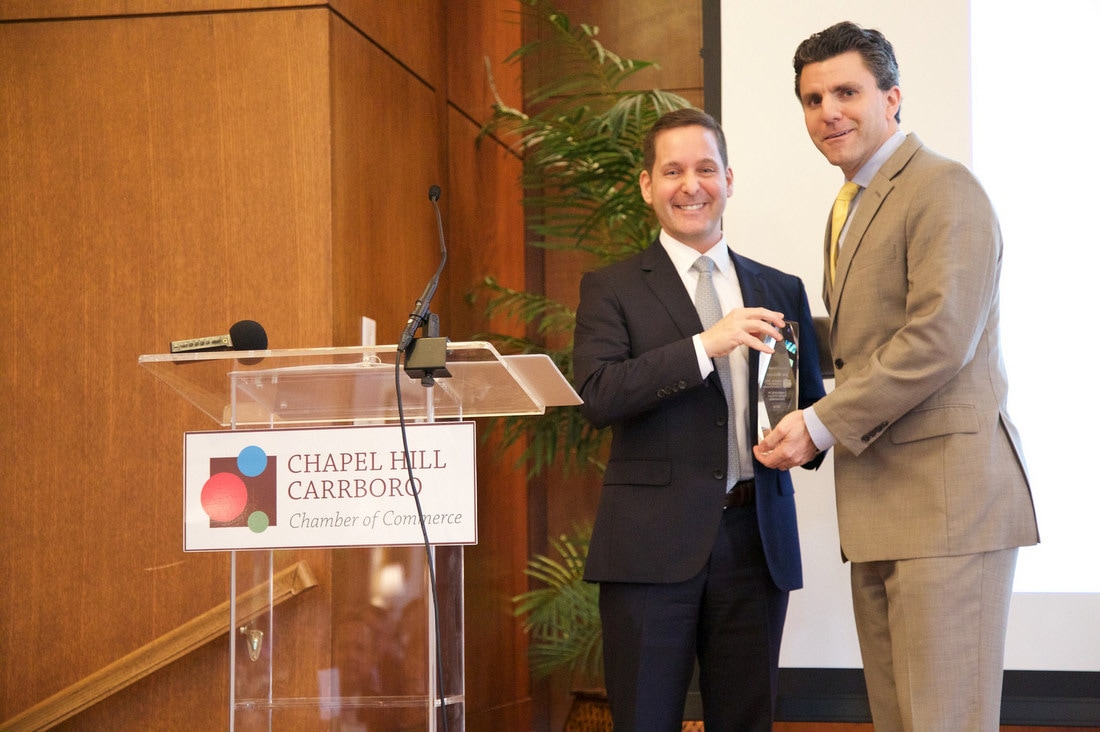
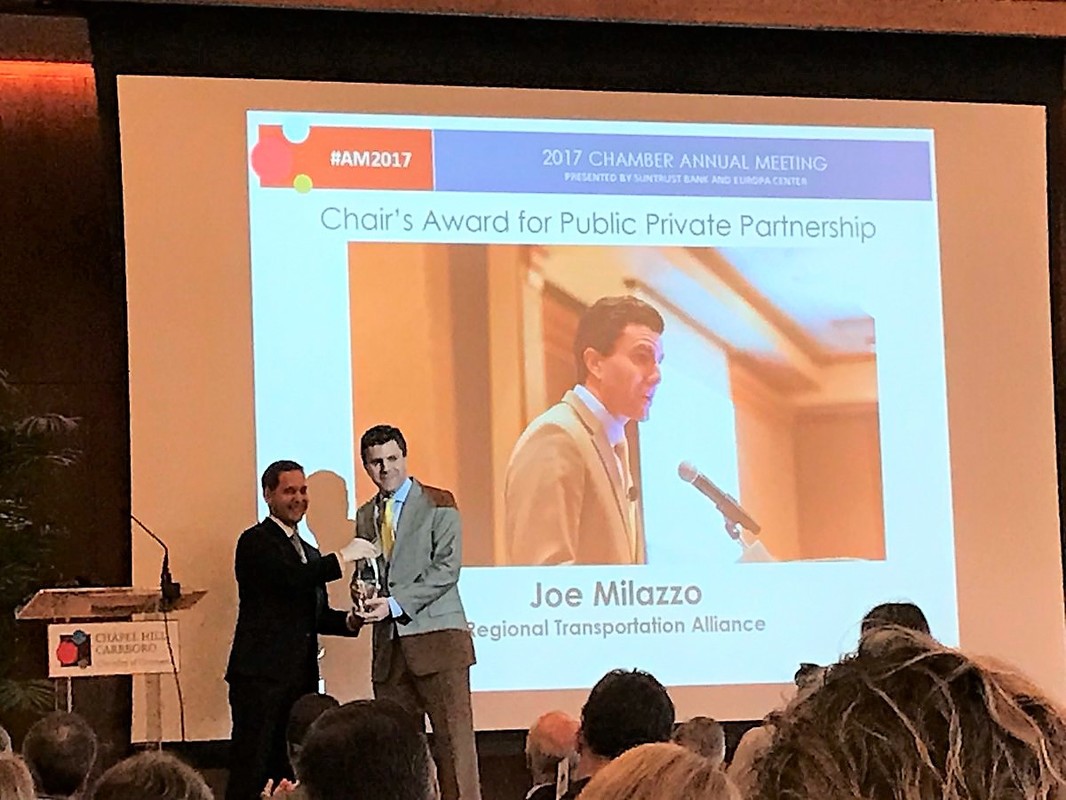
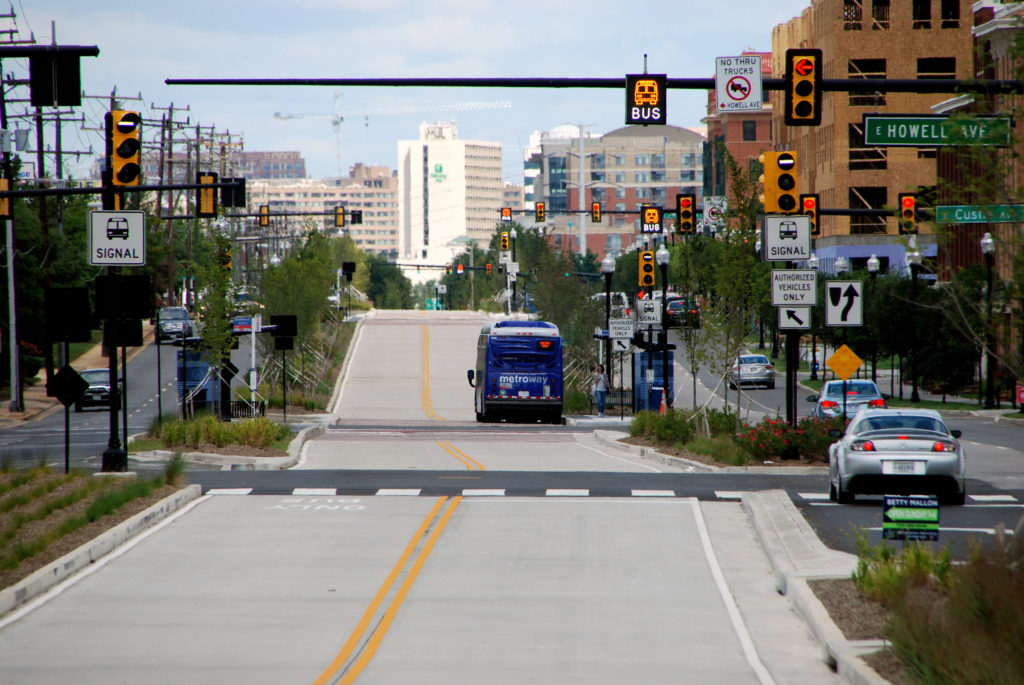
 RSS Feed
RSS Feed